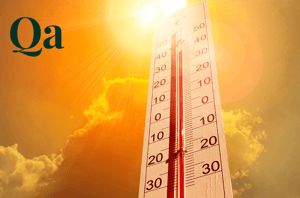
The Hot Connection: How Thermoregulation Impacts Testosterone and Dopamine
Introduction:
The human body is a remarkable system that relies on intricate mechanisms to maintain a state of balance, or homeostasis. One critical aspect of this balance is thermoregulation, the body's ability to regulate its internal temperature. While thermoregulation primarily ensures optimal bodily functions, emerging research suggests that it may also influence hormone levels, including testosterone and dopamine. In this blog post, we will delve into the fascinating relationship between thermoregulation and these two important components of our physiological and psychological well-being.
Testosterone and Thermoregulation:
Testosterone levels can be influenced by changes in body temperature. Studies have shown that exposure to cold temperatures can temporarily increase testosterone production. Cold exposure triggers the release of hormones such as luteinizing hormone (LH), which stimulates testosterone production. Conversely, exposure to high temperatures or heat stress can decrease testosterone levels temporarily. Heat stress may disrupt the hypothalamic-pituitary-gonadal axis, which regulates testosterone production.
Impact of Hormones on Thermoregulation:
Both dopamine and testosterone can influence thermoregulatory processes in the body. Dopamine affects the release of norepinephrine, which plays a role in heat generation and heat dissipation. Dopamine can modulate vasodilation and vasoconstriction in blood vessels, which helps regulate body temperature. Testosterone, on the other hand, can influence metabolic rate and heat production. It affects muscle mass, which can impact the body's ability to generate heat.
Feedback Loop:
Thermoregulation, dopamine, and testosterone can interact in a feedback loop. For example, dopamine plays a role in the regulation of prolactin, a hormone involved in lactation and thermoregulation. Prolactin can influence body temperature by affecting sweat gland activity. Similarly, fluctuations in testosterone levels can indirectly influence dopamine release and function, potentially impacting thermoregulatory processes.
Impact of Sauna and Heat Exposure:
Sauna bathing, a practice involving exposure to high temperatures, has gained popularity in recent years due to its potential health benefits. Interestingly, sauna sessions have been found to influence both testosterone and dopamine. Heat exposure in saunas has been associated with increased testosterone production, improved sperm quality, and enhanced libido. Moreover, sauna-induced heat stress may stimulate the release of endorphins, including dopamine, leading to a sense of relaxation and well-being.
Exercise and Temperature Effects:
Physical exercise is known to have numerous positive effects on hormone regulation and overall well-being. Exercise-induced increases in body temperature can potentially impact testosterone and dopamine levels. Intense physical activity can temporarily raise testosterone production, promoting muscle growth and recovery. Additionally, exercise-related heat stress may trigger dopamine release, contributing to the feelings of euphoria commonly known as the "runner's high."
Sleep, Temperature, and Hormones:
Quality sleep is crucial for hormonal balance, and temperature plays a significant role in achieving optimal sleep patterns. Sleep environment temperature can impact the secretion of testosterone and dopamine. Cooler bedroom temperatures have been associated with higher testosterone levels, while warmer temperatures may affect sleep quality and disrupt hormonal balance. Ensuring a comfortable, cool sleep environment can promote restful sleep and support healthy testosterone and dopamine levels.
Conclusion:
Thermoregulation, the body's ability to regulate its internal temperature, appears to have a fascinating influence on testosterone and dopamine levels. Temperature fluctuations, whether due to environmental factors or intentional practices like sauna bathing or exercise, can impact these essential hormones involved in various physiological and psychological processes. Understanding and optimizing thermoregulation can potentially contribute to improved sexual function, mood, motivation, cognitive performance, and overall well-being.
Maintaining a healthy lifestyle, including regular exercise, a balanced diet, stress management, and adequate sleep, is crucial for optimal testosterone and dopamine levels. Qaly works with you to optimize your testosterone and dopamine levels and improve your health. Qaly offer testing for both neurotransmitters and hormones.

-1.jpeg?width=300&name=china911-t9ArAlsdDAc-unsplash%20(1)-1.jpeg)
